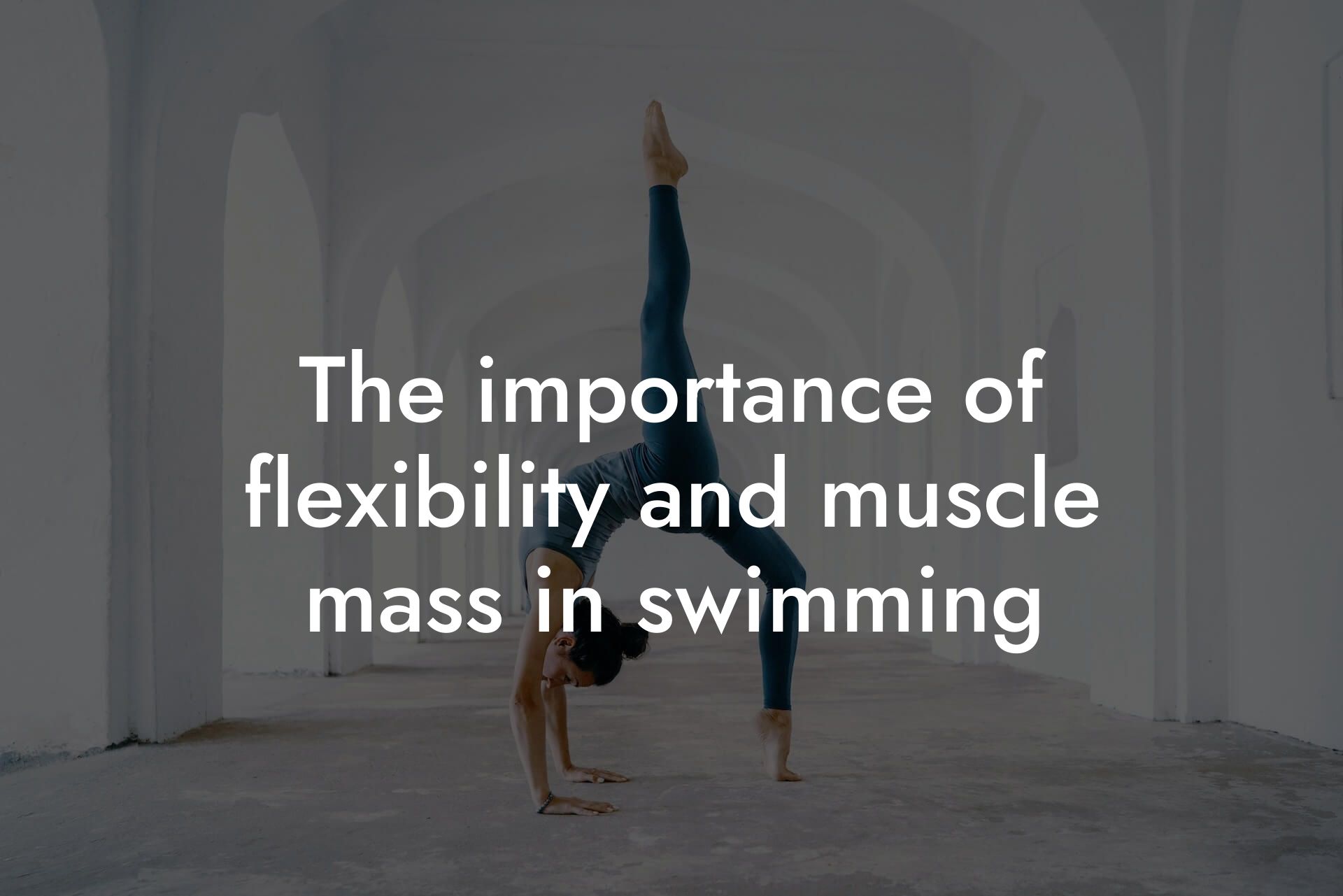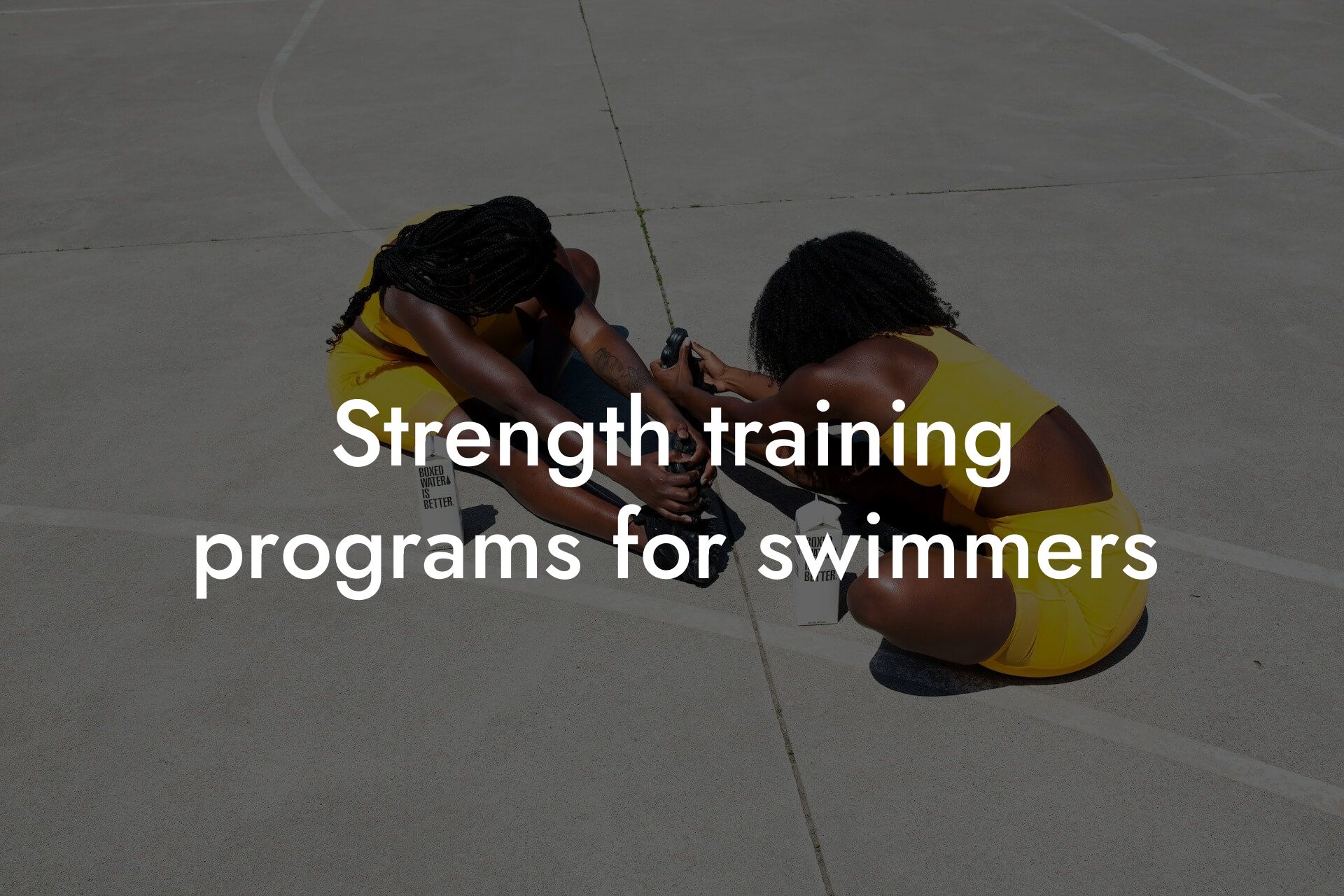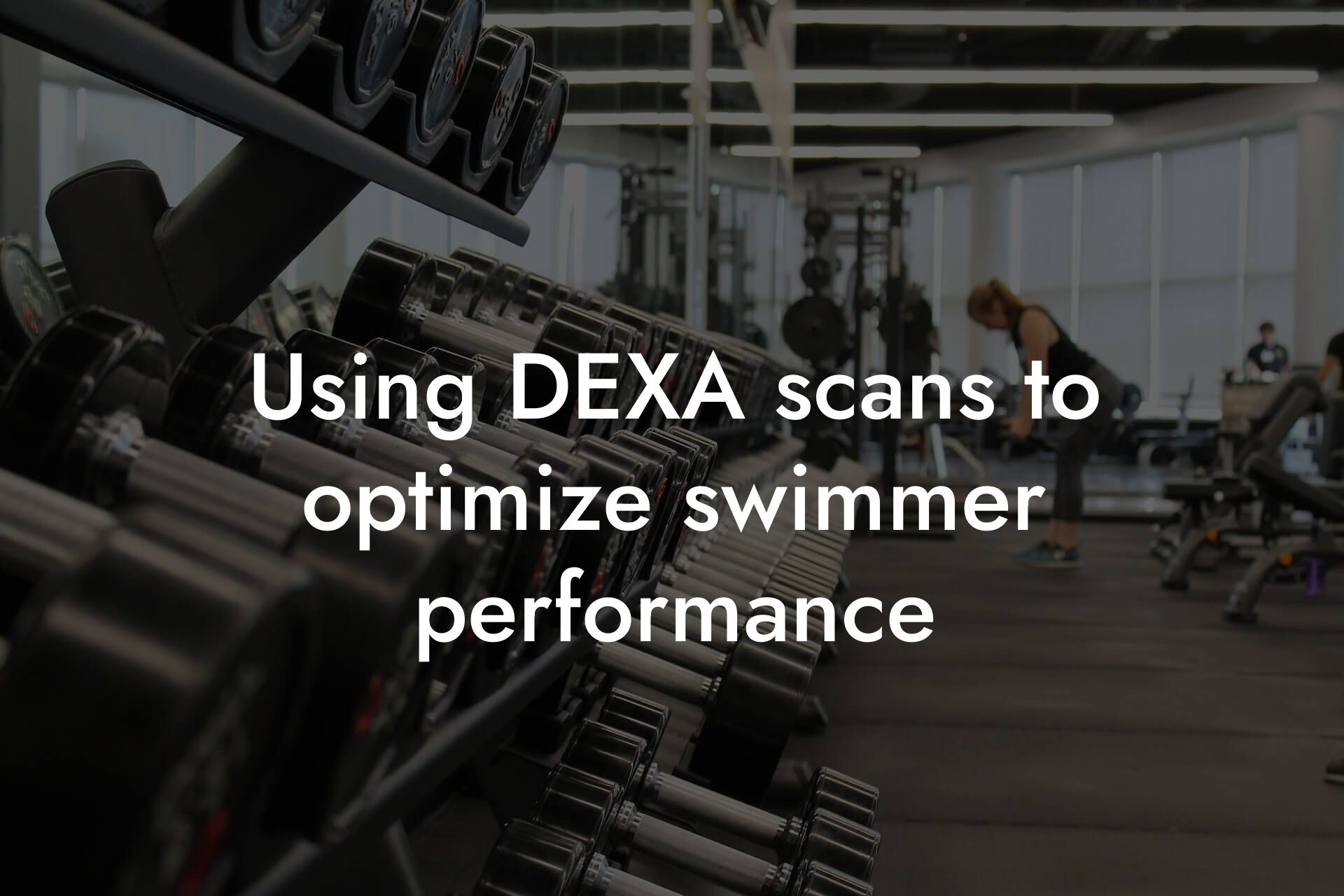Understanding the Importance of Off-Season Conditioning
As a professional swimmer, you know that the competitive season is only part of the journey. The off-season, often overlooked, is a critical period for recovery, rebuilding, and preparation for the next season. A well-structured off-season conditioning program can make all the difference in your performance, allowing you to return to competition stronger, faster, and more resilient. In this article, we'll delve into the essential components of an effective off-season conditioning program for professional swimmers.
Table of Contents
- Understanding the Importance of Off-Season Conditioning
- Phase 1: Active Recovery (Weeks 1-4)
- Phase 2: Strength and Power Development (Weeks 5-8)
- Phase 3: Endurance and Conditioning (Weeks 9-12)
- Incorporating Dry Land Training
- Periodization and Progression
- Nutrition and Recovery Strategies
- Monitoring Progress with DEXA Scanning
- Frequently Asked Questions
Phase 1: Active Recovery (Weeks 1-4)
The first phase of off-season conditioning focuses on active recovery, allowing your body to repair and rebuild from the physical demands of the competitive season. During this period, reduce your swimming volume by 50-75% and incorporate low-intensity aerobic exercises such as cycling, running, or rowing. This will help your body recover from the intense training and competition, while maintaining some level of cardiovascular fitness.
Phase 2: Strength and Power Development (Weeks 5-8)
In the second phase, shift your focus to strength and power development. This is a critical period for building muscular strength, particularly in your upper body, core, and legs. Incorporate resistance training exercises such as squats, deadlifts, bench press, and rows, aiming for 2-3 sessions per week. Additionally, incorporate plyometric exercises like box jumps and medicine ball throws to improve explosive power.
Phase 3: Endurance and Conditioning (Weeks 9-12)
In the third phase, focus on building endurance and conditioning. Gradually increase your swimming volume, incorporating longer, more intense sessions. Introduce high-intensity interval training (HIIT) to simulate the demands of competition. This phase should also include strength maintenance exercises to ensure you don't lose the gains made in Phase 2.
Incorporating Dry Land Training
Dry land training is an essential component of off-season conditioning for swimmers. It allows you to improve your strength, power, and endurance without the repetitive strain of swimming. Incorporate exercises that target your core, shoulders, and legs, such as planks, push-ups, and lunges. Dry land training can also help improve your flexibility and mobility, reducing the risk of injury.
Periodization and Progression
A well-structured off-season conditioning program should follow a periodized approach, with each phase building upon the previous one. Gradually increase the intensity and volume of your training as you progress through the phases. This will help you avoid plateaus and ensure continuous improvement. Regularly assess your progress, adjusting your program as needed to stay on track.
Nutrition and Recovery Strategies
Proper nutrition and recovery strategies are critical components of off-season conditioning. Ensure you're fueling your body with a balanced diet, rich in protein, complex carbohydrates, and healthy fats. Prioritize recovery techniques such as foam rolling, stretching, and self-myofascial release to aid in muscle repair and reduce the risk of injury.
Monitoring Progress with DEXA Scanning
At Tano Performance Group, we understand the importance of tracking progress and making data-driven decisions. Our DEXA scanning technology provides a comprehensive body assessment, giving you valuable insights into your body composition, bone density, and fat percentage. Regular DEXA scans can help you monitor your progress, identify areas for improvement, and make adjustments to your training program.
A well-structured off-season conditioning program is essential for professional swimmers looking to improve their performance and gain a competitive edge. By incorporating active recovery, strength and power development, endurance and conditioning, and dry land training, you'll be well-prepared for the next competitive season. Remember to periodize your training, prioritize nutrition and recovery, and track your progress with regular DEXA scans. With dedication and hard work, you'll be ready to take your swimming to the next level.
Frequently Asked Questions
What is off-season conditioning for professional swimmers?
Off-season conditioning for professional swimmers refers to the training and preparation phase that takes place outside of the competitive season. During this time, swimmers focus on building their endurance, strength, and technique to improve their overall performance and prepare for the upcoming season.
Why is off-season conditioning important for professional swimmers?
Off-season conditioning is crucial for professional swimmers as it allows them to address any weaknesses, improve their technique, and build a strong foundation for the upcoming season. It also helps to prevent injuries, increase endurance, and enhance overall performance.
What are the benefits of off-season conditioning for professional swimmers?
The benefits of off-season conditioning for professional swimmers include improved endurance, increased strength, enhanced technique, reduced risk of injury, and improved overall performance. It also allows swimmers to take a break from intense competition and focus on their overall development as athletes.
How long does off-season conditioning typically last for professional swimmers?
The length of off-season conditioning for professional swimmers can vary depending on the individual and their goals. However, it typically lasts anywhere from 2-6 months, with some swimmers choosing to take a longer break to focus on other aspects of their training.
What types of exercises are typically included in off-season conditioning for professional swimmers?
Off-season conditioning for professional swimmers typically includes a combination of strength training, endurance exercises, and technique drills. This can include weightlifting, resistance band exercises, swimming drills, and dry land exercises such as running, cycling, or strength training.
How often should professional swimmers train during the off-season?
The frequency of training during the off-season for professional swimmers can vary depending on their goals and current fitness level. However, most swimmers aim to train 3-5 times per week, with at least one or two rest days in between.
What is the importance of strength training for professional swimmers during the off-season?
Strength training is essential for professional swimmers during the off-season as it helps to improve their power, speed, and endurance in the water. It also helps to prevent injuries and improve overall performance.
How can professional swimmers incorporate strength training into their off-season conditioning?
Professional swimmers can incorporate strength training into their off-season conditioning by working with a strength coach or personal trainer, using resistance bands or weights, and focusing on exercises that target their core, legs, and upper body.
What is the role of endurance training in off-season conditioning for professional swimmers?
Endurance training plays a critical role in off-season conditioning for professional swimmers as it helps to improve their cardiovascular fitness, increase their lactate tolerance, and enhance their overall endurance in the water.
How can professional swimmers incorporate endurance training into their off-season conditioning?
Professional swimmers can incorporate endurance training into their off-season conditioning by engaging in aerobic exercises such as swimming, cycling, or running, and by incorporating high-intensity interval training (HIIT) into their workouts.
What is the importance of technique drills in off-season conditioning for professional swimmers?
Technique drills are essential in off-season conditioning for professional swimmers as they help to improve their efficiency, reduce their drag, and enhance their overall technique in the water.
How can professional swimmers incorporate technique drills into their off-season conditioning?
Professional swimmers can incorporate technique drills into their off-season conditioning by working with a coach or experienced swimmer, using video analysis to identify areas for improvement, and focusing on drills that target their starts, turns, and finishes.
What is the role of nutrition in off-season conditioning for professional swimmers?
Nutrition plays a critical role in off-season conditioning for professional swimmers as it helps to support their training, aid in recovery, and enhance their overall performance.
How can professional swimmers optimize their nutrition during the off-season?
Professional swimmers can optimize their nutrition during the off-season by fueling their bodies with a balanced diet that includes plenty of protein, complex carbohydrates, and healthy fats, and by staying hydrated by drinking plenty of water.
What is the importance of recovery in off-season conditioning for professional swimmers?
Recovery is essential in off-season conditioning for professional swimmers as it helps to repair their muscles, reduce their risk of injury, and enhance their overall performance.
How can professional swimmers optimize their recovery during the off-season?
Professional swimmers can optimize their recovery during the off-season by getting plenty of rest, using recovery techniques such as foam rolling and stretching, and incorporating recovery tools such as compression garments and ice baths into their routine.
Can professional swimmers still compete during the off-season?
While some professional swimmers may choose to compete during the off-season, it is generally recommended to take a break from intense competition to focus on training and development. However, swimmers may still choose to participate in low-key meets or exhibitions to stay sharp and test their skills.
How can professional swimmers stay motivated during the off-season?
Professional swimmers can stay motivated during the off-season by setting goals, finding a training partner or accountability partner, and rewarding themselves for milestones achieved.
What are some common mistakes that professional swimmers make during the off-season?
Common mistakes that professional swimmers make during the off-season include not taking enough rest, not varying their training, and not incorporating strength training and technique drills into their routine.
How can professional swimmers avoid burnout during the off-season?
Professional swimmers can avoid burnout during the off-season by taking regular breaks, varying their training, and incorporating activities they enjoy outside of swimming.
What is the role of mental preparation in off-season conditioning for professional swimmers?
Mental preparation plays a critical role in off-season conditioning for professional swimmers as it helps to build confidence, focus, and resilience.
How can professional swimmers incorporate mental preparation into their off-season conditioning?
Professional swimmers can incorporate mental preparation into their off-season conditioning by working with a sports psychologist, practicing visualization techniques, and setting goals and affirmations.
What is the importance of flexibility and mobility in off-season conditioning for professional swimmers?
Flexibility and mobility are essential in off-season conditioning for professional swimmers as they help to improve their range of motion, reduce their risk of injury, and enhance their overall performance.
How can professional swimmers incorporate flexibility and mobility exercises into their off-season conditioning?
Professional swimmers can incorporate flexibility and mobility exercises into their off-season conditioning by incorporating stretching and foam rolling into their routine, and by engaging in activities such as yoga or Pilates.
Can professional swimmers still improve their performance during the off-season?
Yes, professional swimmers can still improve their performance during the off-season by focusing on their weaknesses, incorporating new training methods, and staying committed to their goals.
How can professional swimmers measure their progress during the off-season?
Professional swimmers can measure their progress during the off-season by tracking their workouts, monitoring their heart rate and lactate levels, and setting benchmarks and goals for themselves.
What is the importance of seeking professional guidance during the off-season?
Seeking professional guidance during the off-season is essential for professional swimmers as it helps to ensure they are training safely and effectively, and provides them with personalized feedback and support.
How can professional swimmers find a qualified coach or trainer during the off-season?
Professional swimmers can find a qualified coach or trainer during the off-season by asking for referrals, researching online, and interviewing potential coaches or trainers to find the best fit for their needs and goals.
Here are some related articles you might love...
- The importance of flexibility and muscle mass in swimming
- Strength training programs for swimmers
- Using DEXA scans to optimize swimmer performance
- Bone density and its impact on injury prevention in swimming
- Recovery techniques for swimmers after intense training
- Balancing strength and endurance in swimming
- Nutrition strategies for swimmers to maintain energy levels
- The role of body composition in swimming speed and endurance
- Reducing body fat for better buoyancy and speed in swimming
Zak Faulkner
Zak Faulkner is a leading authority in the realm of physical health and body composition analysis, with over 15 years of experience helping professionals optimise their fitness and well-being. As one the experts behind Tano Performance Group, Zak has dedicated his career to providing in-depth, science-backed insights that empower clients to elevate their physical performance and overall health.
With extensive knowledge of DEXA technology, Zak specializes in delivering comprehensive body assessments that offer precise data on body fat, muscle mass, bone density, and overall physique. His expertise enables individuals to make informed decisions and achieve their fitness goals with accuracy and confidence. Zak’s approach is rooted in a deep understanding of human physiology, combined with a passion for helping clients unlock their full potential through personalised strategies.
Over the years, Zak has earned a reputation for his commitment to excellence, precision, and client-focused service. His guidance is trusted by top professionals who demand the best when it comes to their health. Whether advising on fitness programs, nutritional strategies, or long-term wellness plans, Zak Faulkner’s insights are a valuable resource for anyone serious about taking their health and fitness to the next level.
At Tano Performance Group, Zak continues to lead our Content Team revolutionising how professionals approach their physical health, offering unparalleled expertise that drives real results.




